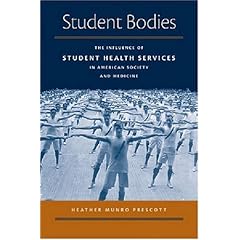The Faculty Mental Health Story That’s Being Missed After the Huntsville Massacre

Three years ago I gave historical reflections on Cho Seung-Hui’s shooting rampage at Virginia Tech. ("Mental Health is Everyone’s Business," HNN April 30, 2007). Today, I will attempt to do the same for the horrific murders of several faculty and staff in the biology department at the University of Alabama, Huntsville on February 12. I empathize with the victims and their families and share others’ shock at the senseless loss of life. Since I am both a client and historian of mental health services I am once again dismayed by the outpouring of prejudice against persons with mental illness that has appeared since the shootings. One article from ABC news quotes a number of psychiatric experts who claim that the "insular lives" of professors — especially those in the sciences — make it easier to hide a mental illness. For example, according to Dr. Igor Galynker, associate chairman for the department of psychiatry and behavioral science at psychiatry at Beth Israel Medical Center in New York City and professor of psychiatry at Albert Einstein college of Medicine, scientists frequently "work in solitude and they don’t need to interact in complex social situations and can be paranoid for a long time without someone realizing." Of course, this fails to recognize that most scientists work collaboratively with others in their field, and anyone who works in higher education interact with students and colleagues on a daily basis. Galynker goes on to use the example of John Nash, the Nobel-winning economist from Princeton, portrayed in "A Beautiful Mind," to argue erroneously, "Brilliant scientists are supposed to be crazy."
Even well-meaning articles replicate misconceptions about mental illness. The Chronicle of Higher Education, for example, describes academia as a "petri dish for madness" because of intense job stress and a "high tolerance for eccentricity" that seldom leads to murder "but it often borders on mayhem." "Where's the bright line between nonconformism and madness?" asks David R. Evans, vice president for academic affairs and dean of faculty at Buena Vista University and contributor to The Chronicle's On Hiring blog.
As historian David Gerber observes in an article on the Blind Veterans Association, "positive stereotypes can be as big a burden as negative ones." Gerber uses the example of the "cliche that the blind are capable of deeper wisdom than the sighted." Blind disability activists, he writes, "denounce this flattering stereotype, just as they denounce negative stereotypes of the blind as helpless or doomed to live in existential or cognitive darkness."
I argue that the same is true of the mythical link between "madness" and "brilliance." For example, psychologist Kay Redfield Jamison attempts to provide "evidence" of link between the artistic temperament and manic-depressive illness by examining the lives and symptoms of Lord Byron, Robert Lowell, and other creative geniuses. Since both Jamison and I are bipolar, I can understand the temptation to find inspiration in the lives of others "touched with fire." Yet, as a historian of medicine, I groan at these "pathographies" of famous historical figures written by modern-day clinicians, and as a disability studies scholar recognize that this type of compensatory history is hardly representative of the experiences of disabled persons throughout history. More often persons with mental illness, no matter how brilliant, have been regarded with suspicion and distrust. These views frequently intersected with other forms of social prejudice. For example, during the early twentieth century, some mental health experts claimed that the scholastic excellence of Jewish students actually made them more prone to mental disturbances and sexual perversions. Dr. Charles W. Burr, Chair of Mental Diseases at the University of Pennsylvania Hospital and a pioneer in the study of schizophrenia, wrote in 1928 that Jews were often precocious in childhood but fell behind children of the "Nordic" race by the time they reached adolescence and adulthood. "The precocious boy," Burr warned, "often becomes an eccentric and not infrequently breaks during adolescence." These anti-Semitic stereotypes were reinforced by the infamous "trial of the century" involving Nathan Leopold, Jr. and Richard Loeb, two young University of Chicago students from wealthy German-Jewish families who, in 1924, kidnapped and murdered Loeb’s fourteen-year old second cousin Bobby Franks. Rather than plead not guilty by reason of insanity, the young men’s defense team, led by Clarence Darrow, called in the nation’s child mental hygiene experts to gain a lighter sentence for his clients based on "mitigating circumstances." The trial reinforced dominant psychological theories that explicitly linked Jewish men’s precocious intellectual ability with mental instability.
This kind of bigotry has thankfully largely disappeared, and federal law prohibits discrimination based on religion as well as race, ethnicity, and gender. The Americans with Disabilities Act has also provided some level of protection for the rights of persons with mental illness. Yet it is clear to me from reading comments to various articles on the Alabama shootings that we still have far to go in changing ignorant attitudes towards persons with mental illness. Several commentators on the Chronicle article mentioned above decry the lack of legal safeguards against "crazies" and bemoan that respect for patients’ rights has made it too difficult to lock up "nut cases." When I started a thread on this subject in the Chronicle’s forum section, this reply nicely summed up the situation: "I'm afraid we're going to end up with the "sane police"--those who patrol everyone seeing who's sane and who's not. Also, if mental illness becomes any more stigmatized, people just won't seek help." Although bullying and violence in higher education are real problems as they are in any job setting, the solution is not to single out those who seem "nutty" or "weird." As I said back in 2007, we need to cease stigmatizing persons with mental illness and provide an adequate level of support and counseling that all Americans deserve.